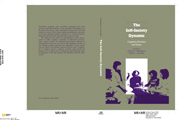Book contents
- Frontmatter
- Contents
- Contributors
- Preface and acknowledgments
- Introduction: The self–society dynamic
- 1 Exploring the relevance of social cognition for the relationship of self and society: Linking the cognitive perspective and identity theory
- 2 Toward a sociology of cognition
- 3 The cerebral self: Thinking and planning about identity-relevant activity
- 4 Growing up: The development and acquisition of social knowledge
- 5 The social contexts of self-feeling
- 6 Self-processes and emotional experiences
- 7 An affect control view of cognition and emotion
- 8 The self-concept as a basis for a theory of motivation
- 9 Attitudes, behavior, and the self
- 10 From changing selves toward changing society
- 11 Possible selves and social support: Social cognitive resources for coping and striving
- 12 Is the road to helping paved with good intentions? Or inertia?
- 13 Social structure and the moral self
- 14 The production of selves in personal relationships
- 15 Conclusion
- Indexes
9 - Attitudes, behavior, and the self
Published online by Cambridge University Press: 23 September 2009
- Frontmatter
- Contents
- Contributors
- Preface and acknowledgments
- Introduction: The self–society dynamic
- 1 Exploring the relevance of social cognition for the relationship of self and society: Linking the cognitive perspective and identity theory
- 2 Toward a sociology of cognition
- 3 The cerebral self: Thinking and planning about identity-relevant activity
- 4 Growing up: The development and acquisition of social knowledge
- 5 The social contexts of self-feeling
- 6 Self-processes and emotional experiences
- 7 An affect control view of cognition and emotion
- 8 The self-concept as a basis for a theory of motivation
- 9 Attitudes, behavior, and the self
- 10 From changing selves toward changing society
- 11 Possible selves and social support: Social cognitive resources for coping and striving
- 12 Is the road to helping paved with good intentions? Or inertia?
- 13 Social structure and the moral self
- 14 The production of selves in personal relationships
- 15 Conclusion
- Indexes
Summary
Introduction
For the past several years, I have been exploring the effects of a cognitive view of the self-concept on behavioral decisions within the context of identity theory. Behavioral decisions have also been examined from a cognitive perspective as a function of general attitudes. Inasmuch as the self-concept is an attitude, a self-attitude, it seems worthwhile to ask how these three concepts of self, attitudes, and behavior fit together within a cognitive framework. This chapter reviews work in each of these traditions and suggests how identity theory can incorporate more general attitudes.
Behavior, the self, and meaning
The self
I begin with a short review of identity theory and some of my work on self and behavior, drawing on Burke and Tully (1977), Burke (1980), and Burke and Reitzes (1981), as well as some development and thoughts since then. From a symbolic interactionist perspective, a person's self is made up of a set of hierarchically organized identities. These identities are viewed as internal, reflexive, positional designations that are tied to social structural positions: doctor, mother, student, professor. In this sense, they are often referred to as role-identities (McCall & Simmons, 1978).
Identities arise and are developed from the different social situations, contexts, and relationships we encounter, but they take on their own coherence and integrity and come to transcend the situations in which they arise. Identities carry the shared meanings and behavioral expectations associated with roles and group memberships.
- Type
- Chapter
- Information
- The Self-Society DynamicCognition, Emotion and Action, pp. 189 - 208Publisher: Cambridge University PressPrint publication year: 1991
- 29
- Cited by



